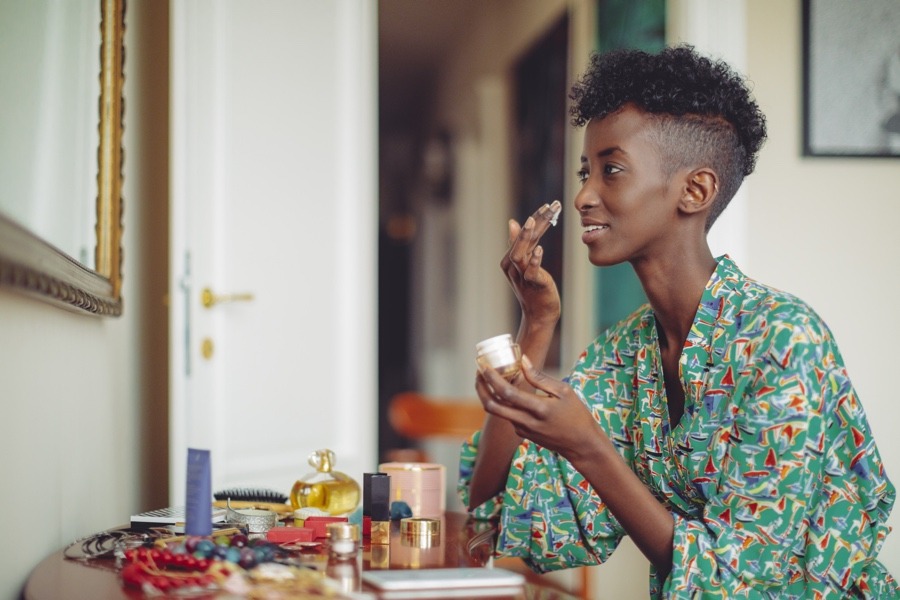We Talked to Dermatologists and Skincare Entrepreneurs About How to Take Better Care of Your Dry Winter Skin
Consider it your ultimate guide to soothing those dry, flaky patches.

Dealing with dry skin now that the weather’s gotten colder? Here’s how to address it. / Photograph courtesy of Getty Images
If it seems like your skin has gone from soft to dry, peeling, and itchy in a matter of days, you’re not wrong. Philly’s sudden swing from 80-degree temps to this colder snap means there’s way less moisture in the air — and less moisture in your skin, especially if you’ve been stripping it of its natural oils with all your hot showers and forced heat.
When your skin’s ultra-dry, you can even develop eczema: inflamed, red, itchy, scaly patches on your hands, legs, arms, face, or even lips. (Researchers believe eczema is genetic, related to a DNA variation that makes skin extra sensitive and irritable to allergens.) In that case, you should head to a dermatologist to see if you need a prescription product that’s stronger or more targeted than the standard over-the-counter moisturizer.
However, if you’re dealing with run-of-the-mill dryness, there are some easy ways to counteract that uncomfortable itchiness. Follow these steps to ensure your winter skin is just as bright and healthy as your summer mug.
Moisturize already.
The word “moisture” is the literal root of this word, so it makes sense that moisturizers are going to provide your skin with much-needed hydration. In general, go with ointments or creams as opposed to lotions. Yes, there technically is a difference; ointments are oil-based and lock in the most moisture. “A lot of people like lotions because they’re so easy to spread, but they’re easy to spread because there’s a lot of water in them and alcohol, which are both drying,” says Naomi Lawrence, a dermatologist and dermatologic surgeon at Cooper University Health Care in south Jersey. “The rule of thumb is the thicker something is, the harder it is to spread, and probably the more emollient it is.”
That’s why multiple dermatologists say our tried-and-true friend Vaseline is the best route to go — as long as you can tolerate the greasiness. If it’s too goopy or you’re too impatient to let an ointment absorb into your skin, go with a thick, fragrance-free cream like Cetaphil or CeraVe. Worried more about time constraints? Franklin and Whitman’s Mount Airy Body Serum, with vanilla, bergamot, and lavender, sprays on quickly and smells like a London Fog latte. Whatever you use, apply it right after your shower or bath, when your skin is still wet and better able to absorb the luscious ingredients.
Note that if you have sensitive skin, and there’s an element in your moisturizer that you’re unknowingly allergic to, it may actually be doing more damage than good. Do some trial and error to see if you can determine which ingredient is wreaking havoc on your epidermis or head to an allergist to get patch tested. (Both false positives and false negatives can occur with allergy skin tests, so your own observations may be necessary regardless.)
Switch from soap to a gentle cleanser.
The chemicals in old-school bar soap tend to have a lower pH (read: more acidic) and can strip the oils from your skin just as much as they clean. While body washes can certainly contain irritating alcohols and scents, Riddle Hospital dermatologist Laura Schilling says, “the ingredients in non-soap cleansers tend to have more skin-friendly pHs that have those moisturizing oils that help hydrate the skin while still doing a good job of cleaning them.” Schilling particularly likes the Hydro Boost line from Neutrogena, which doesn’t have harsh chemicals or alcohols and is packed with über-moisturizing hyaluronic acid, while Lawrence is a fan of Dove Sensitive Skin as well as Aveeno’s Ultra-Calming Foaming Cleanser.
3. Exfoliate.
A layer of dead skin cells might be causing those dry, flaky patches, so getting rid of them by exfoliating at least once a week is crucial. There are two types of exfoliants: physical (think: coffee, sugar, and salt scrubs or pumice powder) and chemical, which include glycolic or lactic acid and penetrate the skin more deeply, so you use them less frequently. Those with dry skin, especially on their faces, do need to be careful of overexfoliating, so you should limit your Clarisonic use to once or twice a week and avoid abrasive scrubs with plastic beads; the Indie Shelf owner and cosmetic chemist Sabeen Zia recommends a chemical exfoliant during the winter to slough away dry skin without scrubbing or a gentle wash, like this shea butter, lemon verbena, and olive seed powder scrub. (You can buy it on Amazon or at her Graduate Hospital store.)
Don’t forget about your hands.
Think about the number of times you wash your hands after going to the bathroom per day. Add in work requirements (think: health care and food workers) and your time in the shower or cooking, and it’s no surprise that your skin might be cracking around your knuckles. Lawrence’s advice? Before heading to bed, apply a thick ointment and then put on a pair of cotton gloves while you sleep. “You’ll be shocked at how beautiful your hands feel in the morning,” she says. “It really soaks into your hands and protects them.”
Or your lips.
Our experts disagree here — some say petroleum jelly’s great for your pucker while others recommend that chapsticks be free of the substance because it makes you lick your lips more often and thus have reapply more frequently. For us, Vaseline seems to have a longer-lasting effect, but the calming, minty sensation of Franklin & Whitman’s Bella Vista lip balm also can’t be beat. Tl;dr conduct your own experiment and go with whichever you prefer.
Or sunscreen.
Here’s your never-too-frequent reminder that ultraviolet rays can do damage to your skin even on cold, cloudy days. And an addendum that you might not know about: The fluorescent lights in your office could be having the same effect. Option #1: Make sure there’s either sunscreen in your moisturizer (makeup is fine if that’s the best you can do, but, as Lawrence says, “nobody puts their makeup on thick enough to actually act as a good enough sunscreen”) #2. Get a tinted sunscreen like Elizabeth Arden Rx Triple Protection Factor for less of a cakey look. #3. Head to the Indie Shelf for SeriouslyFab’s zinc-based sunscreen, which you can spray on periodically over your makeup, to ensure your lunchtime jaunt around Washington Square doesn’t turn into a walk to regret.


